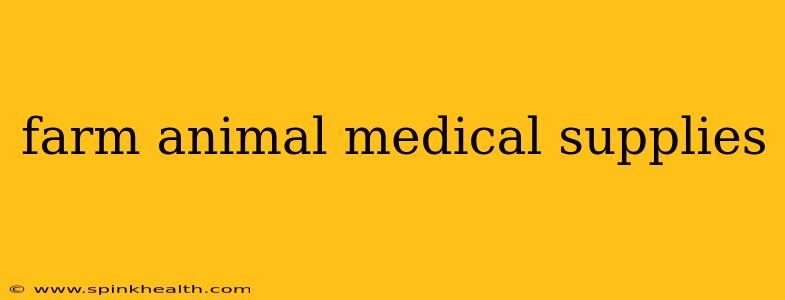Running a farm is a labor of love, and a crucial part of that love is ensuring the health and well-being of your animals. Just like us, farm animals get sick, injured, or require preventative care. Having the right medical supplies on hand can mean the difference between a minor setback and a major crisis. This isn't just about treating illness; it's about proactive animal husbandry and ensuring the profitability and sustainability of your farm.
This isn't just a list; it's a story of preparedness, a testament to the bond between farmer and animal. Let's dive into the essential medical supplies every farm should have readily available.
What are the Most Common Farm Animal Medical Supplies?
This is a question many new farmers grapple with. The answer isn't a one-size-fits-all list, as needs vary based on the type and number of animals you raise. However, certain supplies are consistently crucial. Think of it like a well-stocked first-aid kit, but for your furry, feathered, and hoofed friends.
Essential Supplies for Every Farm:
-
Thermometer: Knowing your animal's temperature is vital in identifying illness. Digital thermometers are quick, easy to use, and offer accurate readings.
-
Stethoscope: Listening to your animal's heart and lungs can provide valuable clues to their health. Practice listening to healthy animals to better discern abnormal sounds.
-
Wound Cleaning Supplies: Antiseptic solutions, sterile gauze, bandages, and surgical scissors are crucial for cleaning and dressing wounds. Proper wound care prevents infection and promotes healing.
-
Pain Relief Medication: Consult your veterinarian about appropriate pain relievers for your specific animal species. Always follow dosage instructions meticulously.
-
Basic First-Aid Kit: Tweezers for removing splinters or ticks, antiseptic wipes, and a pair of strong gloves should be included.
-
Injectable Medications (with Vet's Guidance): Some situations necessitate immediate intervention. Your vet will advise on appropriate injectables, storage, and administration techniques for your livestock. Never self-administer medications without veterinary consultation.
What are the Different Types of Farm Animal Medical Supplies?
The type of supplies you need will depend heavily on the species of animal you're raising. A dairy farm will have different needs than a poultry farm, for example.
Specific Needs Based on Animal Type:
-
Cattle: Supplies specific to cattle might include things like hoof trimmers, drenching guns for deworming, and equipment for treating mastitis.
-
Sheep and Goats: These animals often require supplies for parasite control, hoof care, and lambing/kidding assistance.
-
Poultry: Poultry farmers often need specialized equipment for administering vaccines, treating respiratory issues, and dealing with egg-laying problems.
-
Swine: Pig farmers typically stock up on supplies for treating various skin conditions, digestive issues, and reproductive problems.
-
Horses: Equine medical supplies are more extensive and often require more specialized knowledge to use properly. This includes equipment for wound care, bandages, and medication administration for colic, among other conditions.
Where Can I Buy Farm Animal Medical Supplies?
You can find a range of supplies from various sources. Your local feed store often carries a selection of basic animal health products. Online retailers specialize in veterinary supplies, offering a wider variety and sometimes better prices. However, always ensure you're purchasing from a reputable source that guarantees quality and safety.
How Much Does Farm Animal Medical Supplies Cost?
The cost varies drastically depending on your needs. A basic first-aid kit might cost a few hundred dollars, whereas a more extensive setup, including specialized equipment and medications, can run into thousands. Budget accordingly, and remember that investing in preventative care is often far more cost-effective than treating significant illnesses.
What are the Best Practices for Storing Farm Animal Medical Supplies?
Proper storage is paramount to maintain the efficacy and safety of your supplies. Store medications as instructed by the manufacturer, typically in a cool, dry place away from direct sunlight and extreme temperatures. Keep your first-aid kit organized and easily accessible. Regularly check expiration dates and replace any expired items promptly.
The health of your animals is paramount to your farm’s success. Building a well-stocked medical supply kit is not just an expense, but an investment in the well-being of your animals and the future of your farm. Remember to always consult with your veterinarian for advice on animal health and the appropriate use of medications and supplies. They are your most valuable resource in ensuring your animals thrive.

